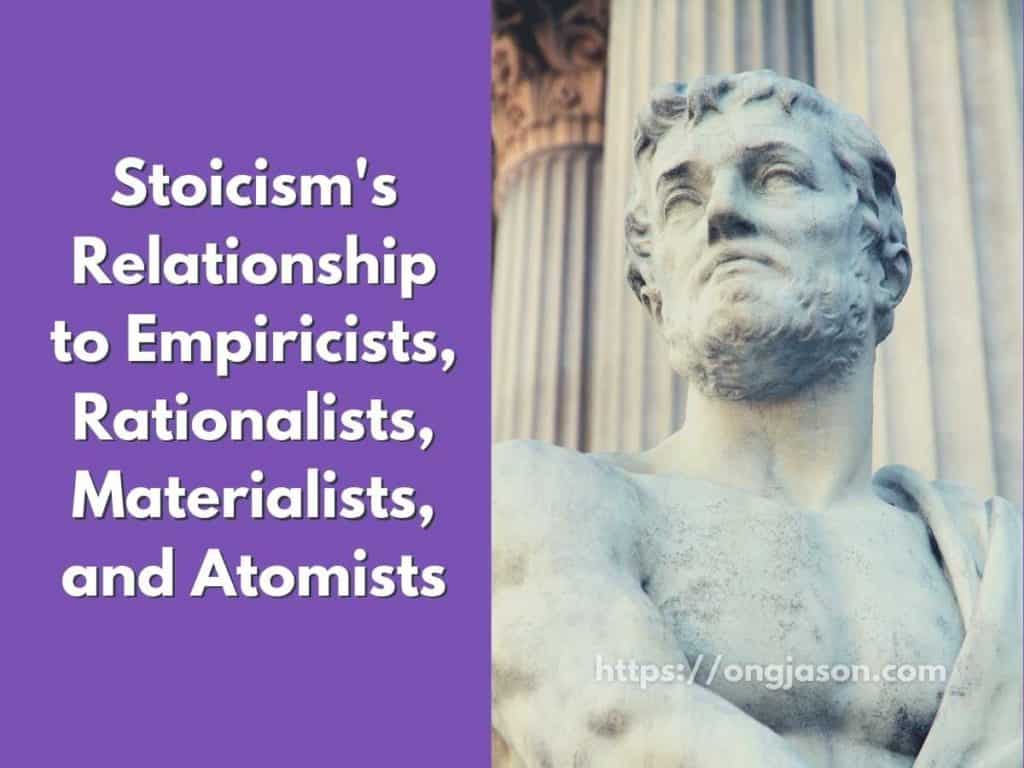Stoicism’s Relationship to Empiricists, Rationalists, Materialists, and Atomists
There are many questions with Stoicism, particularly its relationship to other views such as Utilitarianism, Empiricism, Rationalism, Materialism, and Atomism. I was also interested in knowing Stoic’s relationship to these views. Thus, I decided to compile all of these five to Stoicism.
This blog post will introduce each view, and we will look if it is related to Stoicism. We will see if Stoics are utilitarians, rationalists, empiricists, atomists, materialists, or a combination of these views.

Are Stoics Utilitarians?
Stoics aren’t utilitarians because Stoicism is a values-based philosophy, while Utilitarianism focuses on the utility or consequences of an action. Utilitarianism focuses on the good of the many and the willingness to sacrifice yourself for the good of the many, while Stoicism is about living in accordance with virtue to live a happy life.
Utilitarianism is focused on the good for the many and the consequences of a person’s action.
This means utilitarianists need to weigh everything to seek pleasure and avoid pain.
This is different from Stoicism in the sense that it is value-based.
The Stoics believe in the four virtues: Wisdom, Justice, Courage, and Temperance.
For them, living according to virtues is the key to a happy life.
Whereas Utilitarianism focuses on the utility or the benefits the action gives to people. It is focused on avoiding suffering and consequences while seeking happiness and pleasure.
Thus, Stoics and Utilitarians both believe that the moral worth of an action is determined by its utility. However, Stoics believe that the best course of action is to follow one’s values, while Utilitarians think we should do what will produce the best for the most people.
In short, the difference between the two philosophies is that Stoic Ethics is very much tied to one’s personal identity. On the other hand, Utilitarianism is very much tied to the group of people.
Are Stoics Rationalists?
Stoics aren’t rationalists because they also believe in some aspects of empiricism. Rationalists believe that we learn from our thoughts and value logic over emotions. On the other hand, empiricism focuses on the observation of our environment to learn because it is all-knowing. Stoicism lies in the middle, with Stoics valuing logic while observing their surroundings.
Rationalists are people who base their opinions and actions on reason and knowledge rather than emotional responses.
With this, Stoics can be seen as Rationalists. However, Stoics aren’t a hundred percent rationalist.
The opposing thought of rationalism is called empiricism. If we deep into the philosophy, we can see that Stoics also follow some thoughts on empiricism.
The empiricists believe that we get information from the world because it is all-knowing. Thus, we can take all our knowledge from observing our environment.
If the clause “the world is all-knowing” is familiar, that is because Stoics believe that the world is all-knowing and we are interconnected in this world.
Furthermore, we can see ancient Stoics write things about their observation around them. It may be their observation in nature or thinking of thoughts from other philosophies.
The world is all-knowing or rational, which is one of Stoics’ fundamental beliefs. That’s why there is a famous Stoic saying of “Amor Fati,” or loving one’s fate.
This is because the Stoics believe that Fate or Nature is all-knowing.
Combining all of these, we can say that Stoics combine rationalism and empiricism. They are not 100% rationalists. They aren’t 100% empiricists either.
They got their beliefs from each other. Thus, we can say that Stoicism is balanced where it puts both the practice of rationalism and empiricism into action.
To summarize, Stoics are theoretically rationalists due to their belief that emotions can harm judgment and how they prioritize rational thinking while also believing that the world is all-knowing. We can learn a lot from this world, like empiricists.
So, Stoics are not rationalists. They believe that the world can’t be understood by reason alone. To have a complete understanding of the world, one must also understand their observations in the environment.
Are Stoics Empiricists?
Stoics aren’t purely empiricists because they believe in the value of opinions and actions on reason and knowledge rather than emotional responses. However, they believe in certain aspects of empiricism, such as the belief that we can learn a lot from our environment, which is all-knowing.
While I already talked about empiricism and rationalism earlier, there is still one thing I haven’t tackled.
Empiricists are focused on our environment, while rationalism focuses on one’s opinions and thinking.
Since Empiricists believe in learning from our environment, they believe in observing our surroundings to learn. Therefore, they believe that we can learn almost everything with the world around us.
Rationalists, on the other hand, are about thinking about the world. They are fond of theories and use only logic instead of observations to learn things.
As I already told you, Stoicism is a combination of the two. They believe that we should value logic and value while not letting emotions motivate our actions. They also think that the world is all-knowing and going against fate is irrational.
“…man is like a dog tied to a moving wagon. If the dog refuses to run along with the wagon, he will be dragged by it, yet the choice remains his: to run or be dragged.”
-Marcus Aurelius
This is a quote from a Stoic emperor named Marcus Aurelius. He explains that if we try to go against nature, which is all-knowing, we will live in pain. While living according to nature makes life easier.
Stoics are not empiricists. The Stoics were primarily concerned with studying logic, which is tied with rationalism. However, because the Stoics also believe in observing our environment to learn, they also have some aspects of empiricism.
Are Stoics Atomists?
Stoics aren’t Atomists because they believe they don’t have a solid belief and don’t care about the matter. This is apparent in the writings left by Epictetus. However, generally speaking, they are anti-corpuscularian because they believe in the world’s interconnectedness or cosmos.
Upon searching for answers, Stoics seem closer to not being atomists, unlike Epicureans who fully believe in Atomism.
Furthermore, Stoics seem not to care about the issue, as we can see in a passage written by Epictetus.
“What does it matter to me […] whether the universe is composed of atoms or uncompounded substances, or of fire and earth? Is it not sufficient to know the true nature of good and evil, and the proper bounds of our desires and aversions, and also of our impulses to act and not to act; and by making use of these as rules to order the affairs of our life, to bid those things that are beyond us farewell? It may very well be that these latter things are not to be comprehended by the human mind, and even if one assumes that they are perfectly comprehensible, well what profit comes from comprehending them?
– Epictetus
As you can see from the quote, ancient Stoics seem not to care about Atomism as they believe it doesn’t matter. They also think that trying to know the answer has no profit to their well-being.
Are Stoics Materialists?
Stoics are not materialists because they believe in the importance of values to achieve eudaimonia or happy life. However, they also know that material possessions can bring happiness but is subjected to hedonic adaptation.
According to Meriam Webster, materialism is a preoccupation with or stress upon material rather than intellectual or spiritual things.
Due to this, it seems materialism is closer to Epicureanism than Stoicism.
On the other end, since Cynics are staying away from any material possession, they are the complete opposite of materialism.
On the other hand, Stoicism lies in the middle, where they believe that material possession is essential to happiness while focusing on building their virtues to live a happy life.
As I have explained earlier, Stoics are value-focused when it comes to living a good life. While they don’t forego all material possession, they know the dangers of hedonic adaptation. Thus, Stoicism is a balance between living a materialistic and value-centered life.
What’s next? Have you wondered what the primary goal of the Stoics was? If you want to know more about it, feel free to check my other post here: What is the Stoic’s main goal.






